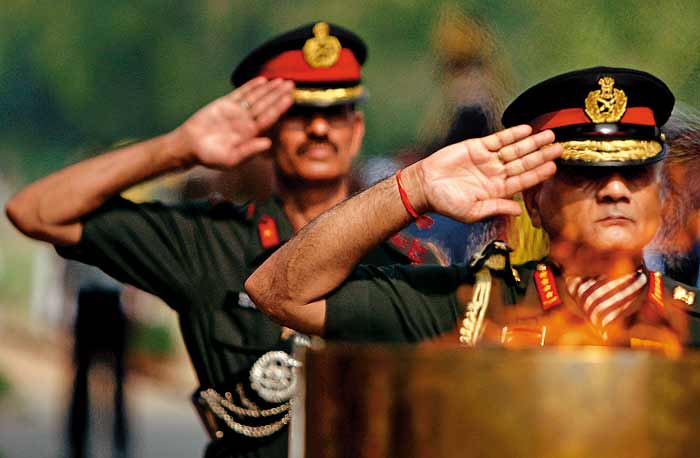No more good morning from now on, its Jai Hind for Indian Army - daily.bhaskar.com

New Delhi: In an unique initiative to "free" Indian Army from its British colonial influence, Chief of the Army Staff General Bikram Singh has asked all its officers to greet each other with a crisp "Jai Hind" instead of any other word. This means it is no more going to be "Good Morning" and "Good Afternoon" greet in the Indian Army, which was mainly a practice among the officers.
So far the jawans of certain units greet with a Jai Hind, while many use other forms of salutations according to their regiments. While that continues, Gen Bikram Singh has asked officers to use "Jai Hind" since this form of salutation is more secular and has a patriotic reverence attached to it. Similarly, all Army functions will now end with "Bharat Mata ki Jai."
The Indian Air Force and the Indian Navy have been using "Jai Hind" for a very long time but the Army was not using it uniformly. The salutation Jai Hind – or Victory to India – was first coined by Major Abid Hasan Safrani of Indian National Army (INA) and was immortalized by Subhash Chandra Bose as the battle cry during fight for independence. This battle cry is believed to have appealed to the freedom fighters and over a period of time became the most sought salutation in the country. Since Indian Army has its roots from East India Company many of the customs and traditions were inherited from the British, including forms of salutation based on different Regiments.
The Army chief has also asked the force to shed frills and five-star culture in unit activities including ceremonial function keeping in mind austerity measures. In order to bridge the gap between personnel, the chief has also asked for cutting down of officer-centric unit events and make them wider by involving persons of all ranks in the unit.
The chief has also asked to give equal opportunities to children of JCOs and Other Ranks to participate in self-development and social-recreational activities to obviate any perception of class divide. The COAS is also personally sensitizing all cadres on these issues.
Meanwhile, to sustain motivation levels of non-empanelled officers it has been decided to send them on foreign postings. "There is high level of frustration among officers who do not get promoted to higher ranks and feel stagnated. To keep them motivated a provision has been made that to give them foreign posting in order to keep them motivated," said an official in ministry of Defense.

New Delhi: In an unique initiative to "free" Indian Army from its British colonial influence, Chief of the Army Staff General Bikram Singh has asked all its officers to greet each other with a crisp "Jai Hind" instead of any other word. This means it is no more going to be "Good Morning" and "Good Afternoon" greet in the Indian Army, which was mainly a practice among the officers.
So far the jawans of certain units greet with a Jai Hind, while many use other forms of salutations according to their regiments. While that continues, Gen Bikram Singh has asked officers to use "Jai Hind" since this form of salutation is more secular and has a patriotic reverence attached to it. Similarly, all Army functions will now end with "Bharat Mata ki Jai."
The Indian Air Force and the Indian Navy have been using "Jai Hind" for a very long time but the Army was not using it uniformly. The salutation Jai Hind – or Victory to India – was first coined by Major Abid Hasan Safrani of Indian National Army (INA) and was immortalized by Subhash Chandra Bose as the battle cry during fight for independence. This battle cry is believed to have appealed to the freedom fighters and over a period of time became the most sought salutation in the country. Since Indian Army has its roots from East India Company many of the customs and traditions were inherited from the British, including forms of salutation based on different Regiments.
The Army chief has also asked the force to shed frills and five-star culture in unit activities including ceremonial function keeping in mind austerity measures. In order to bridge the gap between personnel, the chief has also asked for cutting down of officer-centric unit events and make them wider by involving persons of all ranks in the unit.
The chief has also asked to give equal opportunities to children of JCOs and Other Ranks to participate in self-development and social-recreational activities to obviate any perception of class divide. The COAS is also personally sensitizing all cadres on these issues.
Meanwhile, to sustain motivation levels of non-empanelled officers it has been decided to send them on foreign postings. "There is high level of frustration among officers who do not get promoted to higher ranks and feel stagnated. To keep them motivated a provision has been made that to give them foreign posting in order to keep them motivated," said an official in ministry of Defense.






